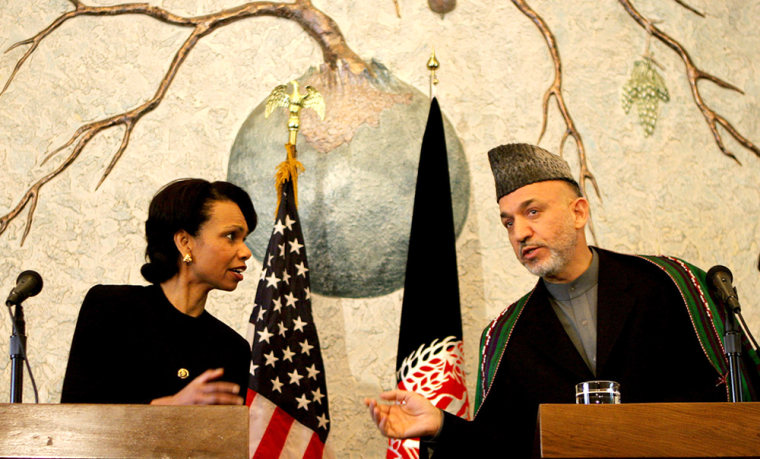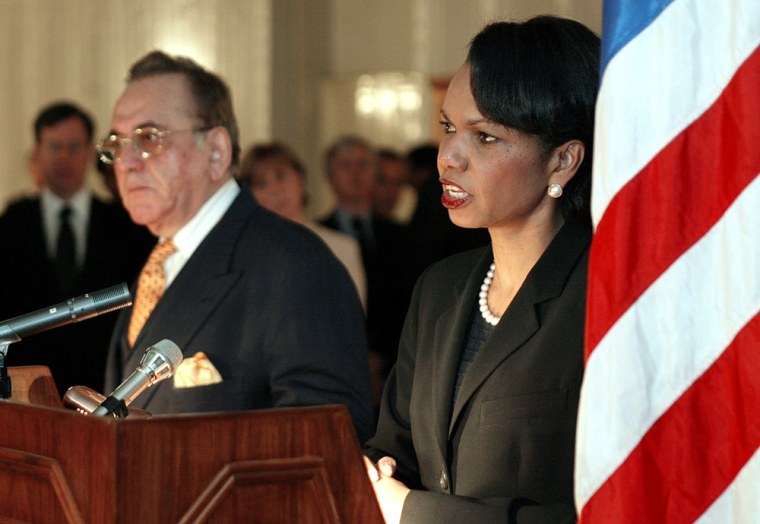Secretary of State Condoleezza Rice on Thursday praised Pakistan’s progress in instituting democratic reforms leading to elections in 2007 and its cooperation in the war on terrorism.
“This is not the Pakistan of Sept. 11. It is not even the Pakistan of 2002,” Rice said at a news conference.
The top U.S. diplomat gave no indication that she pressed President Gen. Pervez Musharraf, who seized power in a 1999 coup, about giving up his control of the armed forces, a longstanding U.S. demand.
Asked about Musharraf’s status, Rice declined to answer, focusing instead on the country’s move toward reform. “We talked about Pakistan’s international development and the need for a democratic path ... toward elections in 2007,” Rice said.
Pakistan Foreign Minister Khursheed Kasuri strongly defended his country’s democratic credentials, saying Pakistan has the freest media in Asia, a significant number of women in government and takes extra precaution to defend the rights of minorities.
“I think we have a working democracy. It can never be perfect,” Kasuri said.
Whistle-stop tour
Rice met with Musharraf on Wednesday, traveled to Afghanistan and then returned to Islamabad for a meeting with her counterpart, Kasuri, and other leaders.
“We admire the courage of the Pakistani leadership and the courage of the Pakistani people and the armed forces in the fight against terrorism,” Rice said.
During her trip to Afghanistan, Rice praised Afghan efforts to clamp down on the heroin trade and Afghan President Hamid Karzai predicted drug production will drop significantly this year.
Without major progress to stem drug production, the drug economy threatens to undermine democratic advances in the nation once ruled by the hardline Taliban regime.
In a March 4 report, the State Department said that more than three years after installing a pro-U.S. government, Afghanistan has been unable to contain opium poppy production and is on the verge of becoming a narcotics state.
Afghan democracy efforts hailed
Rice also applauded Afghan steps toward democracy, including presidential elections that marked the first time many Afghans had ever cast votes and said the United States will not abandon the country.
“We have a long-term commitment to this country,” she said. “We learned the hard way what it meant to not have a long-term commitment. After the Soviet Union left I think it is well understood that we did not remain committed, and I said to the president earlier that in many ways Sept. 11 was a joint tragedy of the Afghan and American people out of that period.”

Karzai said that the next round of elections, for the country’s parliament, will take place in September. That is a delay from the earlier plan to hold them in May, but Karzai rejected any suggestion that the new date marks backsliding on the march toward democracy.
At a news conference with Rice, Karzai said the delay came at the suggestion of an independent election commission and U.N. advisers.
Rice sounded satisfied with Karzai’s commitment to continue reforms and unconcerned about the election delay. “This is a large and complicated country,” she said. “It takes awhile to do these things.”
Karzai described efforts to combat drugs as a journey the country has only just begun. “It’s a long-term fight and requires a long-term strategy,” he said.
Attack shatters calm
Minutes before Rice and Karzai appeared together, a roadside bombing killed at least five people and wounded 32 in the southern Afghan city of Kandahar about 280 miles away.
Police blamed Taliban-led rebels for the attack, which hit a passing taxi carrying women and children, other bystanders, and a roadside restaurant.
Asked about the blast, Karzai denied it was reflective of the current situation in his country. “I believe if you look at the trend, compare us with last year and compare last year and the year before” Afghanistan is now “among the less violent states in this part of the world,” he said.
Earlier Thursday, Rice met with Afghan women political leaders and writers to note their progress in a society where women were forbidden to show their faces, much less participate in open political debate, just four years ago.
She also visited U.S. troops and thanked them for work in difficult circumstances.
“Because of the skill and bravery of the American armed forces we were able with our Afghan allies, the Afghan resistance, to overthrow the Taliban and in doing so to create the possibility of a different kind of Afghanistan that would no longer be a haven for terrorists, but would indeed be an ally in the war on terror,” she told the troops.
